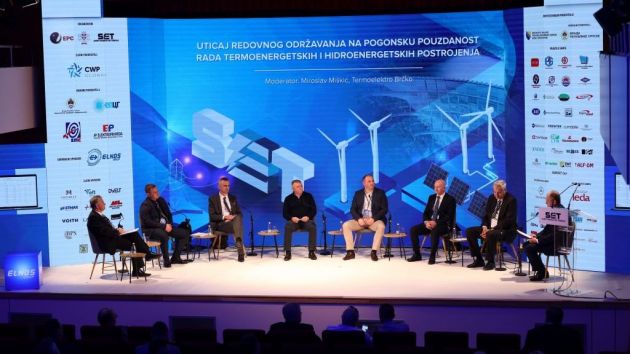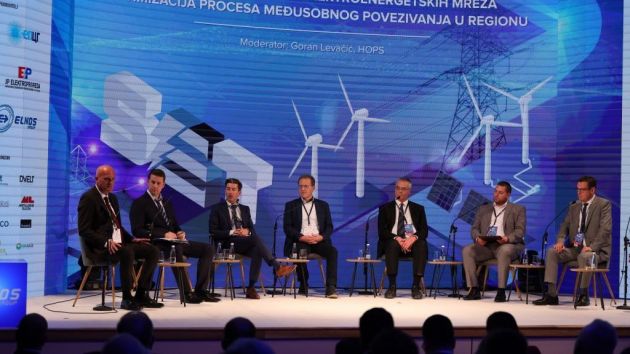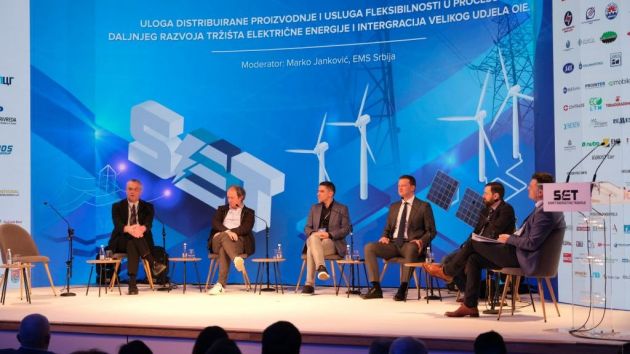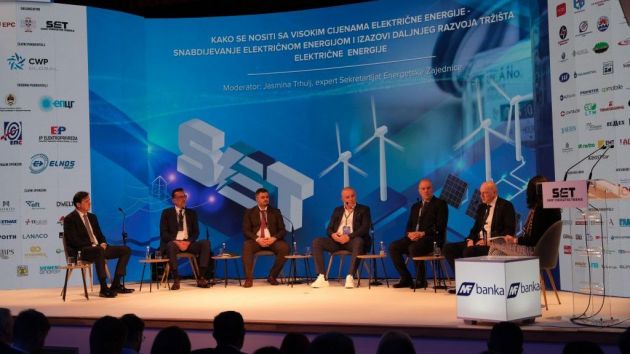SET 2023: Smart Meters Which Send Data in Real Time Necessary for Functioning of Electrical Energy Market
Source: eKapija
 Sunday, 02.04.2023.
Sunday, 02.04.2023.
 13:51
13:51
 Sunday, 02.04.2023.
Sunday, 02.04.2023.
 13:51
13:51
(Photo: SET/3D Media)

In the Banjaluka-based company Elektrokrajina, there is a great need for additionally upgrading the system with such meters. The current situation in this company is clarified by Vladimir Arnaut, the chief coordinator for technical affairs in Elektrokrajina.
– We currently have the old-type network with a direct current, and we had billable quantities once a month. We were not able to know, on a micro level, what kind of service quality we were providing to the users. If we looked at the quality of our job, it would be through two parameters – how many times the power went out and how long it lasted in the course of the year. With the introduction of smart meters, we will not only know that data, but we will also not be able to hide the quality of our operations from the public.
He adds that the biggest benefit will lie in exploitation data, which will enable them to fix the state of the network, to reduce the losses and to meet their legal obligations.
– This is all being implemented due to legal obligations. As a state, we are oriented toward the EU, we want to join them in the energy aspect as well, and they have decided that it will be the penetration of renewable energy sources at the distribution level too. They additionally said that it would be the democratization of energy, that is, the participation of wider layers of society in the provision of energy sector, and the basis for it is the forming of a strong and liquid market that will not be subject to price disturbance and manipulation. And in order for the market to be able to function, we have to have smart meters which send data in real time – Arnaut is clear.
The situation in Serbia when it comes to the production and licensing of smart meters is clarified by Milos Markovic of the company Meter&Control Beograd.
– The primary thing we stick to are the EU directives and, at that level, the meters are protected from any kind of misuse. Data storage is permanent. As producers of meters, we meet all the demands in order to prevent any kind of misuse or unauthorized access to the counter. My opinion is that meter certification is consolidating, both in terms of security and in terms of the standards, which will be revised in the near future. What limits us are the quite high prices of certification, that is, the testing itself. New directives are frequently implemented, which also raises the price of certification. Concretely, in terms of “cyber security” – when the entire system, consisting of three parts, is observed, with pretesting and certification, it would costs us around EUR 100,000, which is a high expenditure. And as a region which has to follow the EU directives, it is very difficult for us to achieve all that. There’s also the time needed for the certification process: with the testing phases, it’s between 12 and 18 weeks. Producers of meters, but also people from the EU, believe that all this slows down that big process of shifting, which is supposed to take place in Europe and locally.
Stefan Krneta, founder of Dwelt and a representative of software producers, also gave his opinion at the panel.
– First, I have to say that we are very satisfied with both the users and the producers of meters, and this is a good example of how local companies can carry out important and large infrastructure projects. Previously, meters were always handled by the distribution company. Now, with the reorganization of the power sector, and in line with the EU directives, the meter is the boundary – everything that happens up to the meter is within the responsibility of the distribution company, and everything after that is within the responsibility of the energy supplier. And so we come to some interesting things when it comes to smart meters – those monthly billable quantities are important for the supplier. However, on the daily level, due to the planning of the production and consumption, the data are important to the distribution company as well. Considering that the reform has led to a fully liberalized market and that, if you are a power supplier, all you need to know about the purchaser in order to learn about their habits can be found on the meter – when and how much they spend…
He adds that the data from the meter, although it is within the responsibility of the distribution company, are also important for the supplier.
– Due to implementing a large number of solar capacities that are connected to the network, we need to do 15-minute consumption profiles. The essence is that everybody needs those data now, that information. The electricity meter is the future processor of a household.
The task of the Regulatory Commission in this process is to follow the Law on Electrical Energy, the Law on RES, the Law on Gas, Oil and Oil Derivatives, points out Petar Duka of the Regulatory Commission for Energy of Republika Srpska.
– We bring a kind of a general framework. According to the new law, we approve a three-year plan of investments and a ten-year plan of development of the power distribution network. This includes the manner of introduction of advanced metering systems and an estimate of the impact of information security. We haven’t yet approved those plans, that’s in the procedure and we believe that the operators of the distribution system, when submitting these plans, should also do cost-effectiveness analyses, both on the side of the distribution system operator and on the side of the users of the system. Indirectly through authorizing the fee for connections to the power distribution network, one of the items is the metering spot. In the past two years, we have changed a range of acts, and also this and next year, we have the obligation of approving bylaws which will concern these problems.
(Photo: SET/3D Media)

Upgrade of Meters
The general manager of Mikroelektronika points out that the panel includes representatives of two domestic companies which are among the top 10 companies observing Europe and China together, which have international certificates at the highest level of European standards.
– The price is the same for us and those Chinese companies which produce a certain product in millions of copies, whereas we produce hundreds of thousands. As producers, they are up to 100 times bigger, and by product unit, we pay the same price for the certificate. And, unlike them, we have no certification house, we pay everything in foreign markets, which didn’t create standards to let us in, but to protect themselves from us. We are competition to them and, every year, they will implement new standards in order to be able to prevent that. A liberal market, which they swear is their business model, is essentially not that.
Prastalo clarifies why it is very important for a state to produce the entire system locally.
– We faced a situation in which the previous generations of smart meters were imported in certain amounts from various world producers and none of them dealt with the maintenance of those systems – at either the hardware or the software level, due to which all those systems slowly died out. Their goal is for us to have to buy the new generation of devices after several years, and not to maintain that system and have it function. Our companies have shown that they are capable of arranging the system, of maintaining it, upgrading it and extending its life cycle in line with the requests of our end users. Which is a win-win situation.
Arnaut picks up the topic and says that smart metering is the first and most important segment which brings the electrical energy system onto the smart network.
– It will also be upgraded with control devices, additional sensors and measuring and, potentially, battery storage, but this is the basic infrastructure. In order to make it, a big step forward will be required from the aspect of communications and security. Previously, there was no need for such devices at the distribution level, there was a need at the transfer level through SCADA systems. I understand why producers say that there’s too much focus on security now, which increases the costs, these are double directives which get intertwined.
When the situation in the region is compared in terms of who has progressed the most in this process, Milos Markovic of Meter&Control says that everybody is at about the same level.
– Where Serbia is ahead is in that the Directorate for Measures and Precious Metals has implemented the Regulation on Measuring Devices, which has been fully transposed to the measuring instruments directives of the EU. Due to that, when we produce a meter, we carry out a statistical verification which is also done in the EU – for example, when you produce a certain lot of meters, say, 500, in line with the standards, we take out 50 meters from the lot and test them for accuracy. So, we have a rounded process in Serbia, as if we were delivering to the EU.
There was also talk about the hybrid sector at the panel – a combination of the producers of kilowatts, those that distribute them, software producers and telecommunications that realize the data transfer.
– In all these years that we’ve cooperated with power distribution companies, a large knowledge base has been formed, which we should develop further and the hybrid profession is to arrive, but the question is what it will look like. In Germany, we have suppliers that work in one office, which they call virtual suppliers. What is important is that, as a company, we have been focused on one sector, one products, and today we have 45 employees, that is, 45 engineers. I am not aware that, in the region, a knowledge base of that size has been created, consisting of people oriented toward one sector and product. And, what’s most important, we have the practice. If Dwelt got a project in RS, FBiH or anywhere outside the borders of our country, the first ones I would ask to join us in that project would be the companies and people that we have cooperated with so far. That base is something that gives us more authority – we run our own system – Krneta clarifies.
Benefits of Smart Meters
What’s important for smart meter producers is to have a market. In order for the other side to be satisfied as well and to buy this product, the necessary conditions need to be met – to provide them with a product they can exploit and upgrade.
– These meters are like mobile phones – you can upgrade the software and you can add new functions to the end-user through the software that Dwelt develops. That is a product that can be used for a longer time period, from which data can be extracted on energy quality, the manner of the use of energy… and based on that data, it can make its own estimates. Because, in the energy sector, the degree of the utilization of the electrical energy is very important – if you generate 100 one day and spend 80, those 20 are wasted. This will be very important when we have providers of electrical energy, when it’s not just state distribution companies, which buy energy and sell it in the market. To them, it will be very important to have information about the quantity of the energy spend at that moment, about the increasing or decreasing trend and whether they will do distribution between one transformation substation area and another. In order to do all that, they have to have just-in-time information. And they will be able to have that with the help of quality meters – Prastalo concludes.
Let us remind that the Trebinje Energy Summit 2023 was held between March 22 and 24, organized by Elektroprivreda RS, the City of Trebinje and the company SET.
The eKapija portal is a media sponsor of the Summit.
More about the panels and events can be found in a special section at the link available HERE.
Slobodana Subara
The rest of the panel can be viewed here:
Tags:
SET Trebinje
Trebinje Energy Summit
Mikroelektronika Banjaluka
Regulatory Commission for Energy of Republika Srpska
Dwelt
Meter and Control Beograd
Dragan Praštalo
Vladimir Arnaut
Miloš Marinković
Stefan Krneta
Petar Duka
smart meters
energy sector security
metering devices
production of electrical energy
distribution of electrical energy
suppliers of electrical energy
production of meters
software for meters
certification of meters
Comments
Your comment
Most Important News
Full information is available only to commercial users-subscribers and it is necessary to log in.
Follow the news, tenders, grants, legal regulations and reports on our portal.
Registracija na eKapiji vam omogućava pristup potpunim informacijama i dnevnom biltenu
Naš dnevni ekonomski bilten će stizati na vašu mejl adresu krajem svakog radnog dana. Bilteni su personalizovani prema interesovanjima svakog korisnika zasebno,
uz konsultacije sa našim ekspertima.


 Izdanje Srbija
Izdanje Srbija Serbische Ausgabe
Serbische Ausgabe Izdanje BiH
Izdanje BiH Izdanje Crna Gora
Izdanje Crna Gora


 News
News












